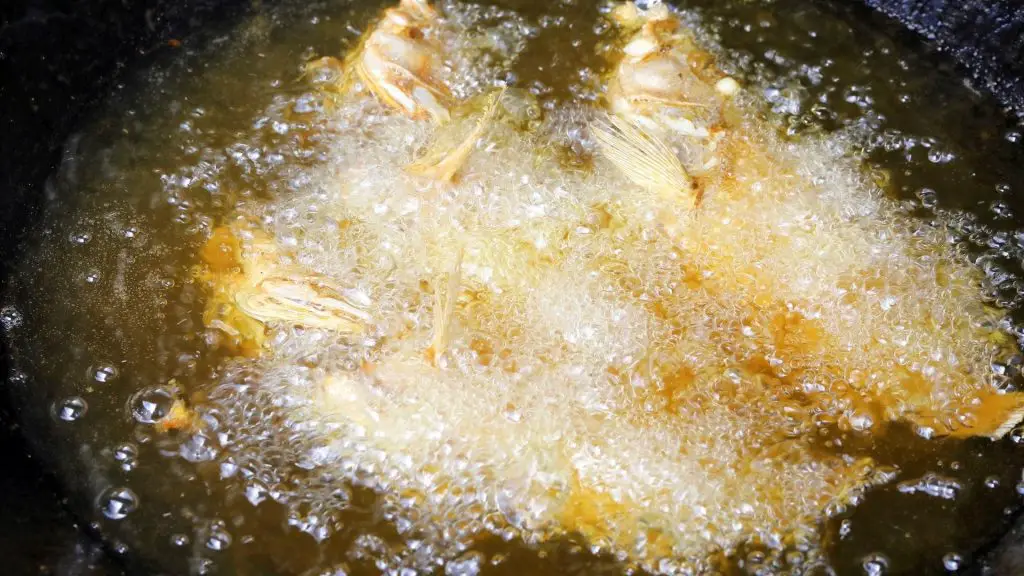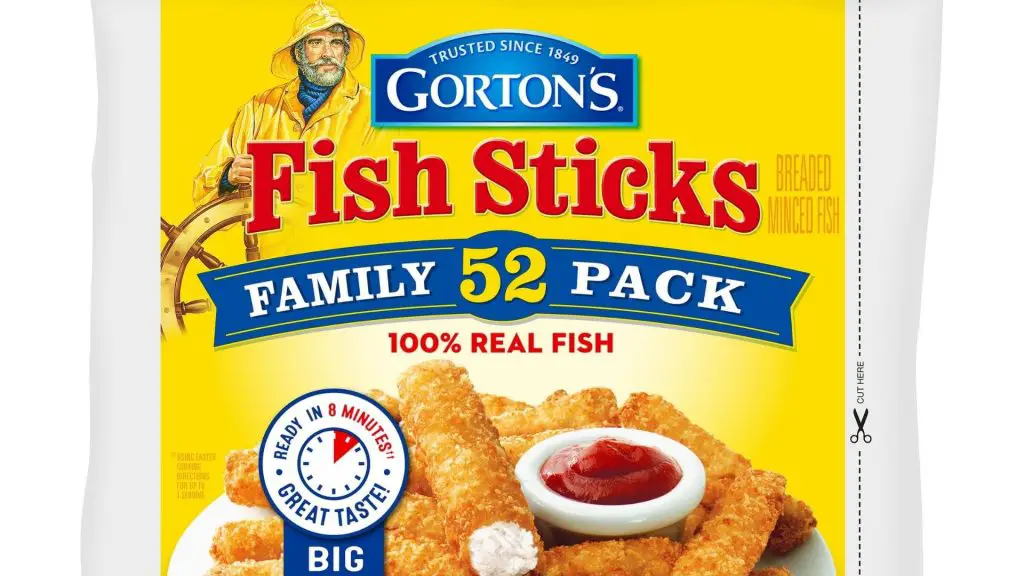Pawscessories is reader-supported. When you buy via links on our site, we may earn an affiliate commission at no cost to you.
Learn more.
As dog owners, we are constantly hounded by our furry friends for food.
Does matter what’s on your plate, your dog is likely looking for a bite.
So what about when you have fish sticks, and your dog is staring at you for a bite.
Can dogs eat fish sticks? Is it safe for them to eat?
Yes, dogs can eat fish sticks in moderation. Fish sticks are safe for dogs when cooked properly and when they do not contain any harmful ingredients. However, this is not a healthy treat for dogs. The high levels of salt, fat, and chemicals found in fish sticks can be harmful when overeaten.
In this article, you’ll discover:
- Nutritional components of fish sticks
- What fish sticks dogs can and can’t eat
- The dangers of dogs eating fish sticks
- What to do if your dog overeats fish sticks (we asked a vet)
- And other frequently asked questions
Let’s dive in.
Table of Contents

Fish Sticks Nutritional Information
Most of us know that fish sticks are probably not the healthiest food.
They are fried, breaded, and fall under the category of processed foods.
Processed foods are those that have been chemically altered and have additives added to them.
The nutritional value of fish sticks can vary depending on the brand, fish used, etc. However, most brands will have similar nutrient levels.
Ingredients & Nutrients
A single serving of fish sticks (about four to five pieces) contains:
- Calories: 190
- Fat: 10g
- Saturated Fat: 1g
- Cholesterol: 30mg
- Sodium: 400mg
- Carbohydrates: 15g
- Sugar: 1g
- Protein: 11g
Ingredients will vary from brand to brand but here are Gorton’s fish sticks ingredients:
Alaska Pollock fillets, breadcrumb coating, vegetable oil (Canola and/or soybean oil), wheat flour, water, yellow corn flour, sugar, salt, onion powder, whey, yeast, baking powder (baking soda, sodium aluminum phosphate, cream of tartar), natural flavor.
Can Dogs Eat Fish Sticks?

Yes, dogs can eat fish sticks, but you must be careful with the ingredients and amount you feed them.
While dogs can eat small amounts of fish sticks, they contain a few ingredients we need to look out for that can harm dogs.
Onion powder, while not harmful in small amounts, can cause anemia in large quantities.
Wheat and corn flour can also be problematic for some dogs as they are common allergens.
If your dog is allergic to wheat or corn, consuming fish sticks can cause gastrointestinal issues such as vomiting and diarrhea.
In addition, the high levels of fat and sodium in fish sticks can also be problematic for dogs.
Fish sticks are often deep fried in unhealthy oils and contain high salt levels.
Eating too much fat can lead to pancreatitis in dogs. While consuming too much sodium can lead to dehydration, electrolyte imbalance, and upset stomach.
So be careful when feeding your dog fish sticks, and do not make it an everyday treat.
Can Dogs Eat Frozen Fish Sticks?
Frozen fish sticks are probably the worst option for dogs.
Sotre-bought frozen fish sticks might not be toxic to dogs. Still, they contain onion powders and preservatives to improve their shelf life.
Some chemicals and additives can be harmful to dogs and cause gastrointestinal distress.
In addition, frozen fish sticks are often fried before they are frozen, which means they can contain high levels of fat.
So while your dog might beg for a taste of your frozen fish stick, it is best to say no.
Can Dogs Eat Breaded Fish?
This answer depends on the fish and breading used.
Certain fish can contain high levels of mercury which can be toxic to dogs. These fish include swordfish, shark, tilefish, and king mackerel.
Breading can also pose a problem as some contain wheat or corn flour which we already know can be problematic for some dogs.
However, if you know your dog can eat wheat and corn and the fish used is not on the mercury list, then breaded fish can be okay for dogs in moderation.
However, it’s much better to just hand them a piece of fresh fish than breaded fish sticks.
Lastly, if you are considering feeding your dog store-bought breaded fish, it is best to check the ingredients first.
Often store-bought breaded fish can contain onion powder or other spices that can harm dogs.
It’s always best to avoid feeding your dog deep-fried foods from the grocery store.
Can Dogs Eat Fried Fish Sticks?

Most fish sticks are fried, so as I mentioned earlier in this article, you need to be careful when feeding your dog fried fish sticks.
While the occasional bite of a fried fish stick probably won’t hurt your dog, you don’t want to make it a common threat.
Are Fish Sticks Safe For Dogs?
Fish sticks are considered safe for dogs in moderation, but there are a few things you need to be aware of.
If a dog is allergic to corn or wheat or overeats, this is when a dog can be at risk from eating fish sticks.
Are Fish Sticks Good For Dogs?
Fish is actually nutrient dense and beneficial for dogs.
However, fish sticks become unhealthy when you add in the breading and frying.
So, generally speaking, no fish sticks are not suitable for dogs.
If you want to feed your dog fish, it’s best to just give them a piece of freshly cooked fish.
This will give them the benefits of fish without all the unhealthy additives and empty calories.
Dangers Of Dogs Eating Fish Sticks
It’s no surprise that fish sticks can be bad for dogs.
Here are some of the potential risks when feeding your dog fish sticks.
Breading & Deep Frying

Deep frying adds unhealthy fats and oils to the fish sticks, which can be difficult for dogs to digest.
In addition, the breading can often contain wheat or corn flour which can cause gastrointestinal issues in some dogs.
Even dogs without allergies may have sensitivities towards it.
Wheat & Gluten Allergies
Many dogs are allergic to wheat or gluten.
It’s actually one of the most common allergens among dogs.
If your dog is one of these dogs, you must be careful when feeding them fish sticks, as the breading can trigger an allergic reaction.
Toxic Ingredients

Many store-bought fish sticks contain onion powder or other spices that can harm dogs.
Frozen fish sticks can also contain chemicals and additives that harm your dog’s health.
Read the ingredients before considering handing your dog some fish sticks.
Sodium
Fish sticks have lots of salt. A dog’s body can’t tolerate these high amounts of salt like humans.
A single serving of fish sticks contains 400mg of salt.
A 10-pound dog should consume no more than 30 mg of salt each day. In contrast, a 75-pound dog should only have 227 mg of salt daily.
Sodium toxicity may result when a dog consumes 2 to 3 grams of sodium per kilogram of body weight.
This is equivalent to about 0.35 to 0.53 teaspoons of salt for every 2.2 pounds of body weight.
Symptoms of salt poisoning include:
- Extreme thirst and urination
- Vomiting
- Lack of energy, weakness
- High fever
- Loss of appetite
- Respiratory distress
- Increased heart rate
- Convulsions or seizures
- Stomach pains
- Muscle spasms
- Walking without balance
- Watery diarrhea
- Tongue swelling
Overeating
A dog that gets into too many deep-fried foods could cause face problems like food bloat, diabetes, cavities/teeth issues, obesity, or pancreatitis.
Pancreatitis can often develop after dogs eat a large helping of something high in fat (like fish sticks).
Symptoms of pancreatitis in dogs include:
- Lethargy
- Hunched back
- Repeated vomiting (several times within a few hours or over several days)
- Diarrhea
- Loss of appetite
- Abdominal pain
- Dehydration
- Fever
- Increased heart rate
- Difficulty breathing
Fish High In Mercury
While most fish sticks use fish like pollock, which is low in mercury, be careful what fish you give to your dog.
Fish high in mercury can lead to mercury poisoning in dogs.
Symptoms of mercury poisoning include:
- Loss of coordination
- Muscle weakness
- Paralysis
- Seizures
- Tremors
- Lack of appetite
- Weight loss
- Diarrhea
- Vomiting
- Bloody urine or stool
- Excessive drooling or saliva production
What Fish Can Dogs Eat?

Certain fish is considered dangerous for dogs to eat due to the levels of mercury.
Here are some low mercury fish that are safe for dogs to eat:
- Salmon
- Lake whitefish
- Mahi-Mahi
- Cod
- Whitefish
- Flounder
- Walleye
- Herring
- Arctic char
Here are some fish heads you should avoid feeding to your dog:
- Shark
- King mackerel
- Tuna
- Swordfish
- Orange roughy
- And any farm-raised fish
These fish are all considered “slow-growing” fish.
As a result, their fish bones are harder, and they usually have higher levels of mercury.
They also have a higher chance of carrying dangerous parasites. So keep these fish out of your dog’s diet.
Further Reading: Can Dogs Eat Fish Heads? Dangers & Benefits (We Asked A Vet)
How to Properly Feed Your Dog Fish Safely

If you want to give your dog fish, you can do a few things to ensure they can eat it safely.
First, check with your veterinarian to see if your dog has allergies.
Some dogs may be allergic to fish or the ingredients in some brands of fish sticks.
Next, consider buying an all-natural or organic brand of fish sticks that don’t contain any harmful chemicals or spices.
You can also make your own fish sticks at home using fresh, whitefish fillets.
Here are some things you want to avoid:
- Too much oil or seasoning
- Fish with high levels of mercury
- Fish bones
- Allergies
You can give your dog one or two fish sticks a week as a treat.
But don’t overdo it, as too much fish can lead to an upset stomach or
Lastly, when you cook fish sticks for your dog, ensure they’re cooked all through.
Undercooked fish can contain harmful bacteria that can make your dog sick.
This is how you can be sure dogs eat fish safely.
Other Frequently Asked Questions
Can Dogs Eat Canned Fish?

For a dog canned fish can be okay, depending on which fish is in the can and what liquid it’s canned in.
Canned fish usually contains a lot of sodium, which can harm dogs if they consume too much of it.
So if you give your dog canned fish, rinse it off with fresh water to remove as much of the salt as possible.
Canned fish in oil is never a good idea. Instead, go with healthier options with fish canned in water or its own juices.
Also, ensure you are not selecting canned fish with high mercury levels.
And as with all things, moderation is key!
Can Dogs Eat Cod Fish?
Yes, dogs can eat cod fish. Cod fish is a good source of protein and omega-three fatty acids, which can benefit your dog’s coat and skin.
Final Thoughts
So can dogs have fish sticks?
Yes, but be mindful of the ingredients and how many they eat.
Fish sticks can cause an upset stomach and diarrhea in dogs.
If your dog ate a lot of fish sticks, keep an eye on them for signs of illness. If you’re concerned, speak to your veterinarian.
There are many dog food alternatives that you can choose instead of fish sticks that are much better for a dog’s diet.
Other posts you might find interesting:
Can Dogs Eat Mahi Mahi? Benefits & Dangers (We Asked A Vet)
Can Dogs Eat Squid? Raw, Fried, or Dried Squid? (Vet Answer)
